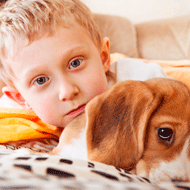
Significant decrease in stress in families who acquire a dog
Owning a pet dog can help to dramatically reduce stress levels in parents who care for children with autism, according to new research.
A team of psychologists and animal behaviour experts at the University of Lincoln found a significant decrease in parental stress in those families who acquired a dog.
Professor Daniel Mills, from the School of Life Sciences, said: “These families are often living under great stress, which can bring detrimental impacts to mental and physical health. This study focussed on the potential of pet dogs to alter parenting stress levels.
"Previous research has suggested that animal-assisted therapy (AAT) can reduce blood pressure and anxiety in a number of individuals. However, AAT typically involves short, structured sessions with a dog, without the additional burden of daily animal care.
"Given the added responsibility that comes with owning a dog, particularly a puppy, we wanted to assess whether parents living in stressful circumstances could still benefit from animal companionship, despite the increase in responsibilities and duties.”
Using a standardised assessment of parental stress, the researchers measured parent's stress levels before obtaining a dog, and at designated periods following that. At the same time, the team measured parenting stress in a control group of parents with a child with autism, who did not acquire a pet dog.
They observed a significant decrease in parenting stress in those families who acquired the dog and a significant number of these parents moved from clinically high levels of parental distress to within the clinically normal range.
"The results highlight the potential of pet dogs to improve parenting stress associated with caring for a child with autism," added Professor Mills.
"As well as improving quality of life for these parents, reductions in parenting stress could also improve problematic child behaviours, with research from other teams suggesting that levels of parental stress can determine the success of autism treatments."
The study, published in the Journal of Autism and Development Disorders, was carried out in conjunction with charities Dogs for the Disabled and the National Autistic Society.



 The latest
The latest